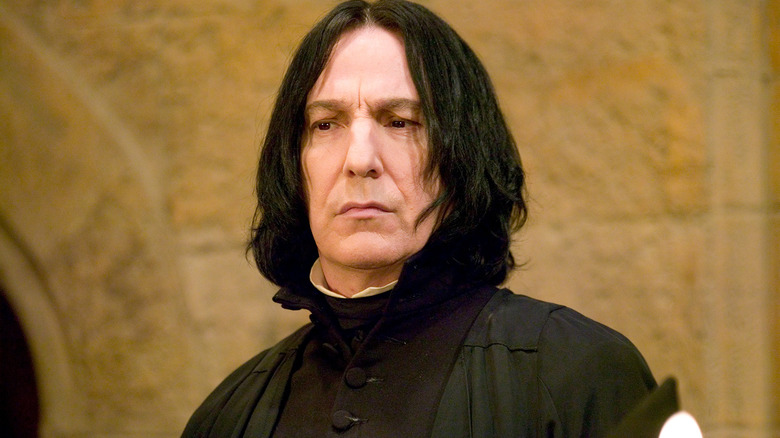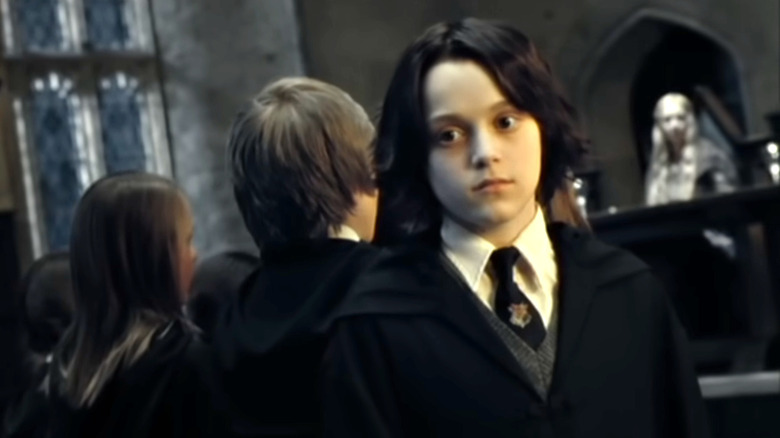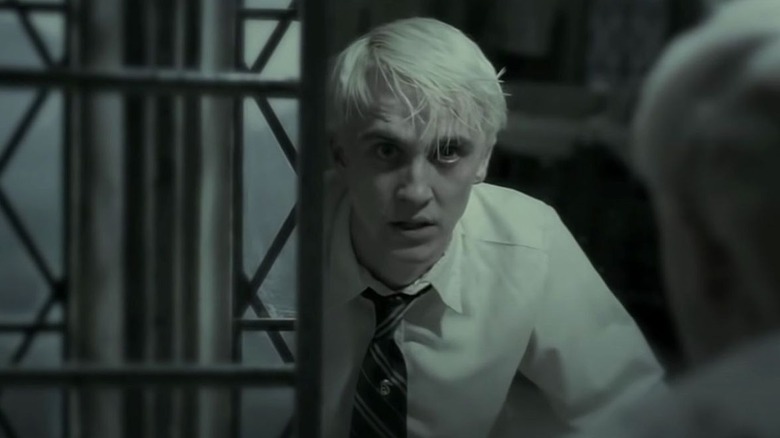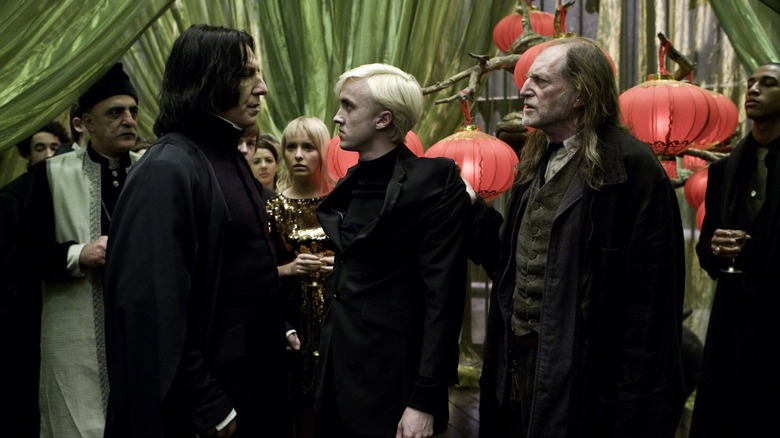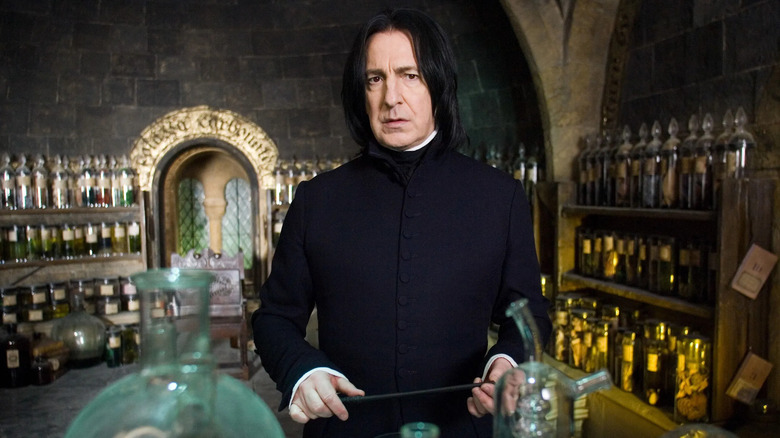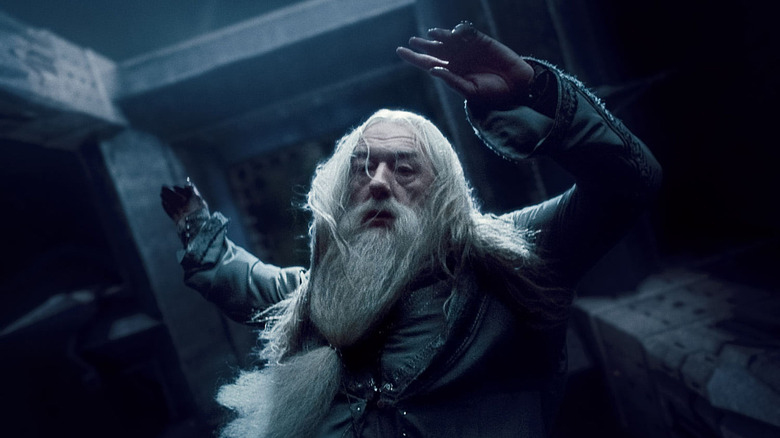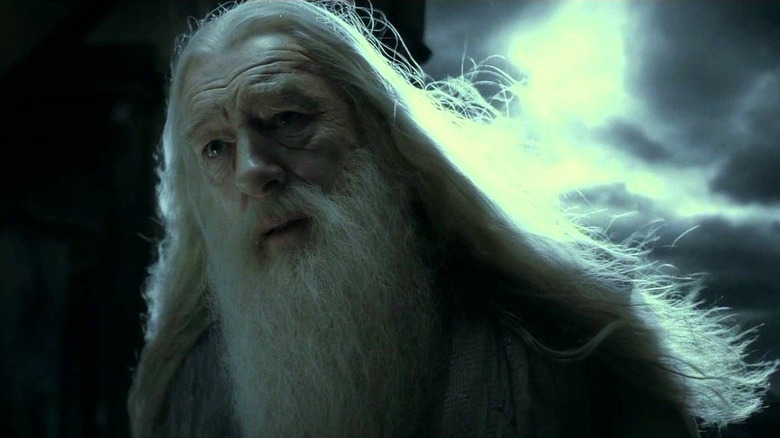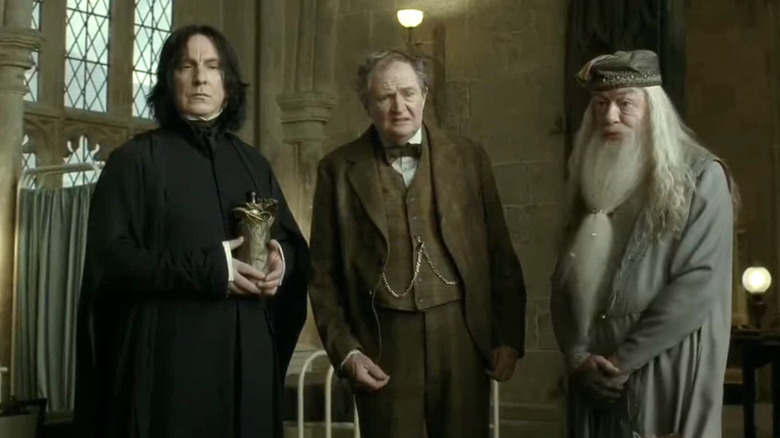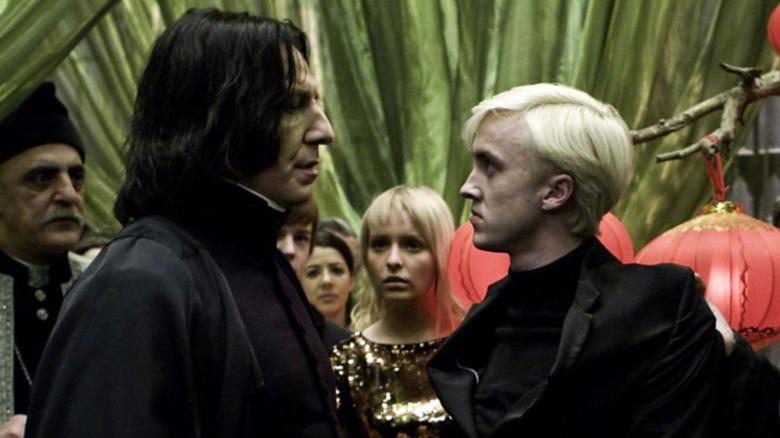Why Snape Kills Dumbledore In Harry Potter And The Half-Blood Prince
With a "Harry Potter" TV series adaptation in the works by Warner Bros, fans have been wondering how it'll set itself apart from the movies, and what the writers will do with all the extra time a TV show allows them. Will they keep in the storyline about Hermione trying to free the house elves and getting laughed at by everyone? Will they flesh out the books' riveting sequences of the kids stressing out about finals? There are a lot of things the show could either expand on or change up throughout its seven main books of source material, but there's one thing that needs to stay the same: Snape has to kill Dumbledore at the end of Harry's sixth year at Hogwarts.
This is perhaps the most famous, most iconic moment in the series, where the seemingly unflappable headmaster Dumbledore is laid low not by Draco Malfoy, who's been tasked with killing him, but by broody potions professor Severus Snape. Readers (and movie viewers) knew that Snape was a jerk, and they even knew he'd joined Voldemort's side back during his first reign, but because Dumbledore kept sticking up for him, we were inclined to assume he could be trusted. Defense Against the Dark Arts professors aside, Dumbledore is generally seen as a good judge of character.
So, what actually happened here? How did wise old Dumbledore let Snape get one up on him like this? For those who need a refresher on this plot point ahead of the TV show, or who simply want to know what happens without giving JK Rowling any more money in the process, here's the tea.
What's wrong with Dumbledore in Half-Blood Prince?
The important thing to know about Snape, which we find out in the final book/movie, is that Dumbledore was right to trust him after all. The guy was a double agent on Dumbledore's behalf, pretending to be on Voldemort's side as part of a very long game of 4D wizard chess. In the three-year wait between "Half-Blood Prince" and "Deathly Hallows," a lot of readers assumed this couldn't be the case, because surely Snape would've figured a way out of killing Dumbledore if he was really on his side. The whole point of being a double agent is to protect your side from devastating blows, and Dumbledore's death (the most powerful member of the resistance) was presumably the most devastating blow of all.
But as it turns out, Dumbledore was dying no matter what. "Deathly Hallows" revealed that Dumbledore had mortally wounded himself by putting on the long-fabled Resurrection Stone, a Deathly Hallow that Voldemort had put a curse on while turning it into a Horcrux. Although Dumbledore was smart enough to know that the ring was cursed before he put it on, he couldn't help himself; he had so much unresolved grief regarding the deaths in his own family that he temporarily lost his better judgment.
The cursed stone would have instantly killed most wizards, but Dumbledore (with the help of one of Snape's potions) managed to contain it to his hand throughout Harry's sixth year. Nevertheless, both Snape and Dumbledore knew it was only a matter of time before the containment broke and the curse killed him. So Dumbledore, wishing to spare both himself and Malfoy some pain, insisted that Snape kill him when the time was right.
Why did Snape join the Death Eaters in the first place?
Present-day Snape's penchant for cruelty throughout the series is a nice reminder of why Snape joined Voldemort's side in the first place: he is, at the end of the day, a total Slytherin. His vindictive nature makes him a good fit with the rest of the Slytherin class, who despite JK Rowling's insistence that they "aren't all bad" are still consistently cruel and petty. Slytherin as a house is a breeding ground for evil; when the Sorting Hat throws you into Slytherin, he's throwing you into a racist, pureblood-supremacist echo chamber for seven years straight.
One of the central lessons of the books, even if it's not clear if the books are intentional about it, is that the house-sorting system at Hogwarts is deeply flawed and it guarantees that each new generation of wizards will have its own pro-Dark Lord segment. It's no surprise that young Snape would start off sweet to Lily as a young kid and then, after several years surrounded by Slytherins, end up ruining his relationship with her forever by calling her a mudblood, the wizarding slur for those with non-magical parents.
If Slytherin didn't exist, would Snape have become a Death Eater? We'll never know for sure; all we know is that by throwing him into Slytherin in the first place, Hogwarts sure wasn't doing much to ensure Snape would ever go down a good path. As much as some fans may defend Slytherin, the wizarding world would be better off if Hogwarts disbanded it and dispersed its students to the other three houses.
Why was Draco Malfoy chosen to kill Dumbledore?
So, Snape stepped in to kill Dumbledore after Malfoy chickened out, but why was Malfoy chosen by Voldemort for the job in the first place? Well, it's complicated. The main reason was simply that Malfoy was available; he was already allowed inside Hogwarts throughout the whole school year, and as an older-year student he had just enough knowledge to maybe pull it off.
But as Malfoy's anxious mother Narcissa pointed out in the early "Half-Blood Prince" chapter, "Spinner's End," it still doesn't make a lot of sense to trust such a job to a 16-year-old. So the other reason Voldemort chose Malfoy to carry out this task was because he wanted to punish his father, Lucius, for abandoning him during the thirteen years Voldemort was powerless and on the run. Sure, Voldemort wanted Dumbledore dead, but he also wanted to punish the Malfoys for their lack of loyalty, so this was his way of achieving at least one of those two goals. Never let it be said that Dark Lords can't multitask.
This storyline was the beginning of Draco's transition from a one-dimensional bully/bigot into a more complicated, tragic figure. Although Harry himself rarely empathizes with Draco, this is the moment where readers realize that the silver-haired menace is capable of emotions like remorse and anxiety. Draco and his family never fully join the side of the good, but they do seem to grow disillusioned with Voldemort's agenda, to the point where Draco in the epilogue appears to have taught his child to be a normal kid without any deranged hatred for muggle-born wizards.
Why Does Snape Kill Dumbledore? The Unbreakable Vow, explained
In addition to fulfilling Dumbledore's request, Snape also had to kill him to fulfill an Unbreakable Vow he made with Narcissa Malfoy at the beginning of "Half-Blood Prince." Narcissa was understandably worried about Draco's safety when she learned about Voldemort's demand, so she went to Snape and made him promise to finish the job if Draco failed. Snape agreed to the Unbreakable Vow, meaning that even if Dumbledore had changed his mind at any point, he'd still have to go through with the plan.
In the "Harry Potter" universe, if you fail to execute your part of Unbreakable Vow, you die. It's a binding magical contract, so one of the only ways out of it is if the vow turns out to be impossible to uphold — if Dumbledore had died of his own accord, for instance, the Vow would be rendered void because there'd be no need for Snape to complete it. You can also escape a Vow if there's some ambiguous phrasing in it and you've managed to find a loophole, but such cases are rare and risky. There's also some fan speculation that you can be released from an Unbreakable Vow if the other person agrees, but there's been no canon confirmation of this idea.
Either way, Snape was already planning to kill Dumbledore by the end of the school year, so agreeing to Narcissa's vow was a pretty easy decision. It was a way to complete Dumbledore's request and gain Voldemort's trust at the same time; as difficult as it must've been emotionally for Snape, it was clearly the right strategic choice.
Why Snape was called the Half-Blood Prince
Throughout "Half-Blood Prince," Harry is suddenly excelling in his Potions class because of a textbook he found that was annotated by a mysterious former student who called himself the Half-Blood Prince. This subplot is even more of an afterthought in the movie; because all the films had far less screen time available to focus on the classwork side of things, the mystery of whose textbook Harry was using was barely a factor at all.
Snape calls himself the Half-Blood Prince because he, like Harry and Voldemort, is a half-blood wizard. Half-bloods are the most common type of wizard in this universe, being people who have at least one muggle-born ancestor, but they're still considered by full-blood wizards like the Malfoys as a step-down. Although Harry is totally fine with his lineage, both Snape and Voldemort are deeply ashamed of their muggle fathers.
But whereas Voldemort copes with his half-blood status by killing his father, Snape chooses the more typical teen route of giving himself a broody nickname in his diary. He calls himself Half-Blood Prince because his mother's surname was Prince; it's basically his way of saying, "Yes, I may be a half-blood, but I'm way more of a Prince than a Snape."
On a narrative level, the mysterious title allows Harry to empathize with Snape on a level he never would otherwise. Harry's often impressed or sympathetic with the Half-Blood Prince's writings, in a way that he probably wouldn't be if he'd known who the author was. The book also serves as a way to put the two characters on equal footing; 16-year-old Harry is going back in time and interacting with 16-year-old Snape, unknowingly faced with the knowledge that the two teens weren't that different. It makes their years-long animosity towards each other all the more tragic, knowing they probably could've gotten along if it wasn't for Voldemort's impact on both their lives.
How did Snape actually kill Dumbledore?
In the years between the release of "Half-Blood Prince" and "Deathly Hallows," there were thriving websites like Dumbledore Is Not Dead, where readers gave their theories about what actually happened in that final scene between the headmaster and his potions professor. One point of contention surrounded Snape's exact method of murder, in which he used the Avada Kedavra spell, AKA the worst of unforgivable curses.
People often complain that it's weird for only three curses in the wizarding world to be considered unforgivable, especially since there are plenty of other ways to kill people that don't involve the killing curse. The Sectumsempra spell Snape invents sure as hell looks like it should be illegal, for instance; it's not only lethal but it seems extremely painful too, whereas Avada Kedavra is quick and painless. However, there's an in-universe explanation for this apparent discrepancy: the killing curse isn't just bad because of what it does, but because of what it says about the person who uses it. In order for the spell to work, you have to mean it. A curse like Sectumsempra can be used by accident, as we saw with Harry, whereas Avada Kedavra can only be done on purpose.
So at first glance, the fact that Snape uses the Avada Kedavra curse was a point in the "Snape really is evil" camp's favor. If he didn't hate Dumbledore, it seemed, then how could the spell possibly have worked? However, other fans argued that Snape (a master of nonverbal spell casting) didn't use the killing curse at all; instead, he cast some other stunning spell that didn't require genuine hatred in his heart to work. That's why Dumbledore is pushed backward after the spell, whereas most victims of the killing curse simply collapse where they are.
The other explanation is that some fans are taking the "you have to mean it" explanation for Avada Kedavra too literally. Truly hating and wanting someone dead sure sounds like the same thing, but in Snape's situation, there's a clear distinction here. We don't know for sure exactly what was going through Snape's mind as he did the deed, but it does seem reasonable to take his "Avada Kedavra!" line at face value. Just because Snape truly wanted Dumbledore dead at that moment doesn't mean he didn't like him.
How Dumbledore's death is different in the books
Dumbledore's death is mostly the same in the movie, with one major difference: movie Harry is never immobilized. In the books, Dumbledore silently casts a spell that paralyzes Harry while he's under the invisibility cloak, making it so Harry can't interfere with Draco/Snape's actions in any way. In the movies, Harry can interfere, but he doesn't because Dumbledore told him not to. Some fans were disappointed with this change, as it seems out of character for Harry — famous for being recklessly brave — to just stand there as Dumbledore's life is in danger.
However, the change makes sense when you remember just how much would have to be explained in the film to make it work. Dumbledore's a master at casting spells without speaking, so the movie would have to figure out a way to tell us Harry's been hit by a paralyzing curse without a word being spoken, in the middle of an already complicated sequence.
The other change is that the movie cuts out the whole battle around the Astronomy Tower, where a bunch of Harry's friends fight a bunch of death eaters with the help of some luck potion Harry won earlier in the book. It's sort of understandable why the movie would cut this — presumably so that the big Hogwarts battle in "Deathly Hallows" could have more impact — but it still makes the ending to the film feel weirdly low-key. I definitely understand why this movie's often ranked lowest amongst book readers, as it takes the most liberties with the source material.
Still, when it comes to the core of its finale, capturing the shock and grief of Dumbledore's demise, I think the movie still nails it. With the elements of his death that truly mattered, the movie stayed true.
What did Alan Rickman think about Snape killing Dumbledore?
For actor Alan Rickman, the death was a little underwhelming. "The scene seems oddly lacking in drama — on the page — but that is absolute cause and effect of screenplays that have to conflate (deflate) the narrative," Rickman wrote in his diary at the time of filming. "We don't know — or remember — enough about individual characters' concerns to understand their issues. Or care."
A lot of Rickman's thoughts on his character and the larger franchise were revealed in his diaries, which were released to the public in 2022. His writing caught attention mainly because it was far more critical than the actor let on at the time; with Rickman criticizing John Williams' score for the film and taking shots at young Emma Watson's acting, his released diary entries immediately sparked concerns about the choice to release them to the public in the first place. Isn't the whole point of a diary that it's supposed to be private? Would Rickman have referred to 14-year-old Watson's diction as "this side of Albania at times" if he'd known that it would've been reported to the world all those years later?
Of course, not everything about the "Harry Potter" franchise in Rickman's diary was negative. He talked positively about the final reveal around Lily Potter in "Deathly Hallows," even crediting it as the main thing that kept him from leaving the series prematurely. As he wrote:
"Snape dies heroically, Potter describes him to his children as one of the bravest men he ever knew and calls his son Albus Severus. This was a genuine rite of passage. One small piece of information from Jo Rowling seven years ago – Snape loved Lily [Potter] – gave me a cliff edge to hang on to."
Snape also saved Draco's son in the Cursed Child timeline
In "The Cursed Child," a play written by Rowling and Jack Thorne, continues with the general theme with Snape wanting to keep Draco's son, Scorpius safe. Granted, the story is much better watched than just read. Through some time-turner shenanigans, "The Cursed Child" presents us with a timeline where Harry dies in the Battle of Hogwarts but Snape doesn't, and it takes the opportunity to explore how Snape would handle such a turn of events. Would he continue fighting against Voldemort after Voldemort seemingly won it all, or with the last bit of Lily gone, would he turn to the dark side yet again?
Snape not only keeps fighting against Voldemort, but he does so by allying with Hermione and Ron. "I couldn't save Harry for Lily. So now I give my allegiance to the cause she believed in," he tells the two. "And it's possible — that along the way I started believing in it myself." This version of Snape helps out Harry's troubled son, Albus Severus Potter, as well as Scorpius, who is Albus's best friend. Snape comes in clutch with helping the two friends recreate the books' original timeline, sacrificing his life at one point to help Scorpius escape some dementors.
"The Cursed Child" seems almost like a reaction to the fandom's gradual pulling back from the worship of Snape's character; it feels like writer Jack Thorne could see the growing consensus that Snape sorta sucked even with the Lily backstory considered, so this plot point helped to prove that Snape really was as good a guy as fans thought in the immediate aftermath of the "Deathly Hallows" release.
If you're hoping to prove that Snape's a genuinely good person, it's probably best to stick to evidence from just the original seven books.
